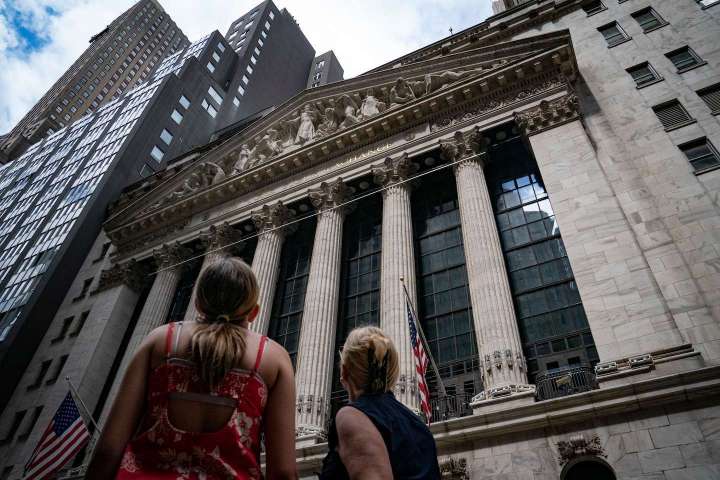We’ve been hearing a lot about a recession lately, and I’m willing to bet that we’re going to be hearing lots, lots more, starting Thursday morning.
Recession experts don’t think we are in one and neither do I

That would be the second straight quarter that “real GDP” — GDP adjusted for inflation — is negative. And to lots of people, including many of my media colleagues, two straight quarters of negative real GDP growth means we’re in a recession.
However, regardless of the GDP number that we see Thursday, I don’t think we’re in a recession now, and we may end up being lucky enough not to have one at all.
Let me explain.
The official arbiter of when recessions begin and end is the Business Cycle Dating Committee, which is part of the National Bureau of Economic Research.
And if you consult the people on the dating committee, you’ll see that six months of declining real GDP does not a recession make.
“To me, the two-quarter criterion is irrelevant,” says Bob Hall, a Hoover Institution senior fellow and Stanford economics professor who has chaired the committee since its inception in 1978.
How do Hall and the rest of the committee define a recession? “In a recession,” Hall told me, “economic activity is significantly depressed and is spread across the economy for more than a few months.”
In an FAQ on its website, the NBER specifically rejects the definition of a recession as two straight down quarters.
“There are several reasons,” the NBER says. “First, we do not identify economic activity solely with real GDP, but consider a range of indicators. Second, we consider the depth of the decline in economic activity. The NBER definition includes the phrase, ‘a significant decline in economic activity.’ Thus real GDP could decline by relatively small amounts in two consecutive quarters without warranting the determination that a peak had occurred.”
Does it look to you like the U.S. economy comes anywhere close to having significantly depressed economic activity that’s been spread across the economy for more than a few months? It doesn’t look like that to me.
For starters, the unemployment rate is hanging in at 3.6 percent, the lowest rate in at least 20 years. And although wages aren’t rising as fast as our highest-in-40-years inflation rate, they’re rising at around 6 percent a year, the highest rate since at least 1998.
I’m reasonably sure they’ll keep rising even after the inflation rate falls, because recent layoff announcements notwithstanding, there are a lot more jobs available than there are people looking for work.
In one crucial economic and social area — gasoline prices — inflation has started to fall. The average national price for a gallon of regular gas on Tuesday was $4.327, according to AAA.
Yes, that’s 37 percent more than a year ago, but it’s down 14 percent from the peak of $5.016 on June 14. So most of the fall since mid-June won’t be recognized in Thursday’s inflation adjustment for GDP in the second quarter, which ended June 30.
Industrial production is still doing well, with the Industrial Production Index at its highest level since at least 1920, according to FRED Economic Data from the St. Louis Fed.
Finally, personal spending (as of May, the most recent available date) was at its highest level ever, according to the St. Louis Fed’s FRED, which used data from the Bureau of Economic Analysis.
Put all of this together, and you see why I don’t think we’re in a recession.
The Federal Reserve says the same thing, albeit indirectly. the Fed, which is trying to slow the economy by raising interest rates, says it doesn’t want to touch off a recession.
That means that the Fed thinks we’re not in a recession now.
I think one reason for our recession obsession is that inflation and economic uncertainty are making people far more open to bad news than they’d normally be.
In addition, we have millions of people who are struggling to cover their inflated gasoline and food bills and are understandably scared and upset about prospects for themselves, their families and our country as a whole. You can see why many of them might think that a recession is inevitable, if not already here.
And finally — please forgive my skepticism — talking and writing about a recession, real or imagined, increases readership and viewership for media enterprises and is just more interesting than economic news normally is.
“Recoveries tend to be nice and smooth, and boring from a media point of view,” Hall told me. “Recessions are exciting.”
In addition, there are political advantages to promoting the recession idea. Talking about a recession lets both mega-right-wing Republicans and ultra-left-wing Democrats complain about President Biden supposedly leading the economy off a cliff.
Recession talk gives conservatives a peg to pitch their cut-taxes solution and lets liberals promote their spend-more-and-raise-taxes-on-the-rich solution.
Look, I’m not saying that things are great or that the economy isn’t going to deteriorate. Or that Bob Hall’s committee isn’t going to decide sometime next year that the U.S. economy peaked this summer or fall.
What I am saying is that if you look at what the Business Cycle Dating Committee says a recession is, a definition that’s generally accepted by serious economic thinkers, you’ll see that we’re not in a recession now. Regardless of what we hear Thursday morning.






